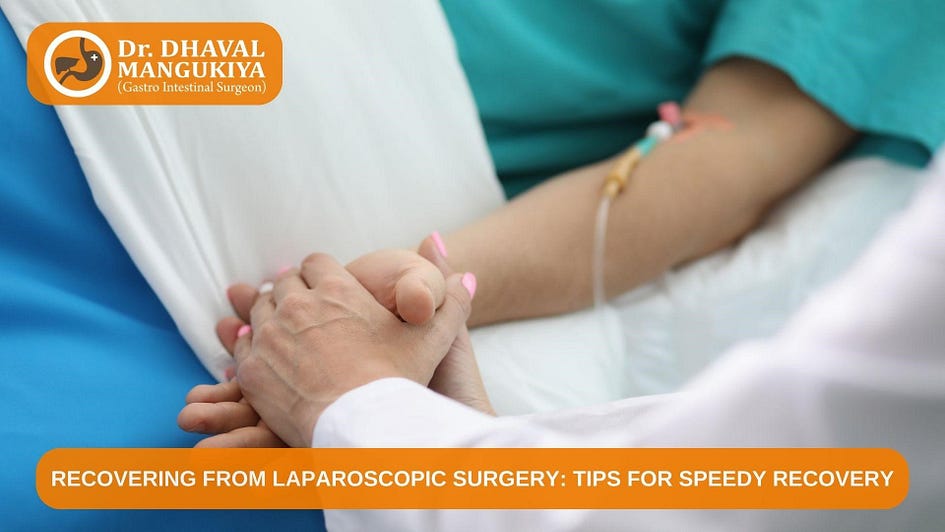Recovering from Laparoscopic Surgery: Tips for a Speedy Recovery From The Best Laparoscopic Surgeon In Surat

Laparoscopic surgery, also known as minimally invasive surgery, has become a popular choice of many patients due to its benefits over traditional open surgery. Being one of the best gastrointestinal surgeons in Surat, Dr. Dhaval Mangukiya underlines its benefits such as smaller incisions, reduced pain, and faster recovery times. However, even with these advantages, proper care and attention to recovery are crucial. This blog by him will provide you with essential tips for a speedy and smooth recovery after laparoscopic surgery.
What is Laparoscopic Surgery?
Laparoscopic surgery involves small incisions through which a camera and specialized instruments are inserted to perform the procedure. This technique is commonly used for gallbladder removal, hernia repair, and appendectomies. Despite its minimally invasive nature, your body still undergoes significant stress and requires adequate time to heal.
Immediate Post-Surgery Care
Dr Dhaval Mangukiya, one of the best pancreatic surgeons in Surat, shares the following tips for patients who have recently undertaken a laparoscopic surgery:
1. Follow Medical Advice
The first and foremost step in your recovery is to follow your surgeon’s instructions diligently. This includes taking prescribed medications, adhering to dietary restrictions, and attending follow-up appointments. Ignoring medical advice can lead to complications and prolong the recovery process.
2. Pain Management
Pain and discomfort are common after laparoscopic surgery. Your doctor will prescribe pain medications to manage this. Take them as directed and do not wait for the pain to become severe before taking your dose. Additionally, applying a warm compress to the area can help alleviate discomfort.
3. Gradual Movement
While rest is vital, it is equally important to start moving around gently as soon as your doctor permits. The best pancreatic surgeons in Surat say that early mobilization helps prevent blood clots and promotes better circulation. Start with short, slow walks and gradually increase the duration and intensity as you feel more comfortable.
4. Avoid Strenuous Activities
Being one of the best laparoscopic surgeons in Surat, Dr Dhaval Mangukiya advises to avoid heavy lifting, intense exercise, and any activities that put strain on your abdominal area for at least a few weeks post-surgery. Strenuous activities can lead to complications such as hernias or reopening of the surgical site.
5. Proper Rest
Ensure you get plenty of rest and sleep. Your body needs time to repair itself, and adequate sleep is crucial for this process. The best gastro surgeons in Surat suggest creating a comfortable sleeping environment, and avoiding activities that could disrupt your sleep, such as consuming caffeine late in the day.
6. Follow a Balanced Diet
Eating a nutritious diet aids in recovery. Focus on consuming a balanced diet rich in vitamins, minerals, and proteins to support tissue repair and boost your immune system. Incorporate foods like fruits, vegetables, lean meats, and whole grains into your meals.
7. Stay Hydrated
Hydration is key to a smooth recovery. Drinking plenty of fluids helps in flushing out toxins and keeps your bodily functions running smoothly. Aim to drink at least eight glasses of water a day, and avoid sugary or caffeinated beverages.
8. Small, Frequent Meals
Large meals can be hard on your digestive system post-surgery. Instead, opt for small, frequent meals throughout the day. This can help in preventing nausea and bloating, common aftereffects of laparoscopic surgery.
9. Keep the Incision Site Clean and Dry
Proper wound care is essential to prevent infections. Follow your doctor’s instructions on how to clean the incision site. Typically, this involves gently washing with soap and water and patting the area dry. Avoid submerging the wound in water until it has fully healed.
10. Watch for Signs of Infection
Keep an eye out for signs of infection such as redness, swelling, warmth, or discharge at the incision site. If you experience a fever or severe pain, contact your healthcare provider immediately, says Dr Dhaval Mangukiya, one of the best pancreatic surgeons in Surat. Early detection and treatment of infections are crucial for a swift recovery.
11. Stay Positive
Recovery can be challenging, and maintaining a positive attitude is essential. Surround yourself with supportive friends and family members who can offer encouragement and assistance when needed. Engaging in relaxing activities, such as reading or listening to music, can also help in maintaining a positive outlook.
12. Seek Professional Help if Needed
It’s not uncommon to feel anxious or depressed after surgery. If you find yourself struggling with your emotions, don’t hesitate to seek professional help. A counsellor or therapist can provide strategies to cope with these feelings and support your mental health during recovery.
13. Attend Follow-Up Appointments
Regular follow-up appointments with your surgeon are crucial. These visits allow your doctor to monitor your progress, address any concerns, and make necessary adjustments to your recovery plan. Missing these appointments can result in overlooked complications.
14. Communicate Openly with Your Healthcare Provider
Keep an open line of communication with your healthcare provider. Report any unusual symptoms or concerns promptly. Early intervention can prevent minor issues from escalating into major complications.
Conclusion
Recovering from laparoscopic surgery requires patience, care, and adherence to medical advice. By following these tips, you can ensure a smoother and faster recovery, allowing you to return to your daily activities with minimal disruption. Remember, every individual’s recovery process is unique, so listen to your body and give it the time it needs to heal properly.
Comments
Post a Comment